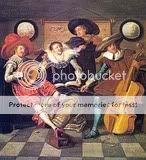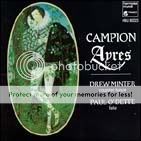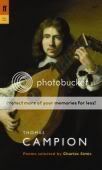Poetry Wednesday 01/23/08: Thomas Campion

Above: Conrad Kiesel (1846-1921), The Lute Player , oil on canvas. German
A Tribute to Thomas Campion
 The English poet, composer and doctor Thomas Campion (1567-1620), established his reputation as a poet in the 1590s and published his first songs in 1601. He wrote and composed masques for royal entertainment, particularly after the succession of King James of Scotland to the throne of England as James I, and was unusual in that he wrote both words and music for his many songs with lute accompaniment.
The English poet, composer and doctor Thomas Campion (1567-1620), established his reputation as a poet in the 1590s and published his first songs in 1601. He wrote and composed masques for royal entertainment, particularly after the succession of King James of Scotland to the throne of England as James I, and was unusual in that he wrote both words and music for his many songs with lute accompaniment.
Campion’s musical legacy consists entirely of some 119 lute-songs. Many of these were published in a series of four Bookes of Ayres. They include the vivid “Fire, fire, fire fire loe here I burne, Never weather-beaten saile” and “Woo her, and win her, he that can”, among a rich collection.
Thomas Campion was born in London on February 12, 1567. He was a law student, a physician, a composer, a writer of masques, and a poet. Campion’s parents died when he was still a boy, but they left enough money to send him to Peterhouse College, Cambridge, in 1581. He left Cambridge in 1584, apparently without taking a degree, and in 1586 was admitted to Gray’s Inn in London to study law. He participated in the Gray’s Inn revels of 1588 and contributed songs to the Gesta Grayorum revels of 1594, but seems never to have been called to the bar.

Campion’s first poetic attempts were in Latin. His love of quantitative versification in classical Latin poems carried over into his English poems and songs. Campion was first published in 1591, when five of his songs appeared in Newman’s unauthorized edition of Sidney’s Astrophel and Stella. Four years later he published his own book, a collection of Latin epigrams, called Poemata (1595). Campion’s reputation rests chiefly on his lyric poems, which are distinguished for their musical quality and charm. They were published 1601-1617 in four books of airs, beginning with A Booke of Ayres to be Sung to the Lute, Orpherian and Bass Viol (1601).
In 1602 Campion, a theorist of prosody, published the prose work “Observations in the Art of English Poesie”, in which he attacked “the vulgar and unartificial”, that is, inartistic, custom of rhyming. Campion’s theories on poetry, which he himself rarely followed, were refuted by Samuel Daniel in Defence of Rhyme (1603).

Campion spent three years (1602-1605) on the Continent, and received the M.D. degree from the University of Caen in 1605. After returning to England, Campion was practising as a doctor in London from 1606. During that time, he wrote several masques which were performed at the court of James I. Perhaps the best of them was the Lords’ Masque (1613). In 1613 he also published A New Way of Making Fowre Parts in Counterpoint, a book on music theory. In 1615, Campion was questioned about the murder of Sir Thomas Overbury, but was found innocent and released. Campion died in London, probably of the plague, on March 1, 1620, and was buried at St. Dunstan’s-in-the-West.
It Fell on a Summer’s day
by Thomas Campion
It fell on a sommers day,
While sweete Bessie sleeping laie
In her bowre, on her bed,
Light with curtaines shadowed,
Iamy came: shee him spies,
Opning halfe her heauie eyes.
Iamy stole in through the dore,
She lay slumbring as before;
Softly to her he drew neere,
She heard him, yet would not heare,
Bessie vow’d not to speake,
He resolu’d that dumpe to breake.
First a soft kisse he doth take,
She lay still, and would not wake;
Then his hands learn’d to woo,
She dreamp’t not what he would doo,
But still slept, while he smild
To see loue by sleepe beguild.
Iamy then began to play,
Bessie as one buried lay,
Gladly still through this sleight
Deceiu’d in her owne deceit,
And since this traunce begoon,
She sleepes eu’rie afternoone.
When Laura Smiles
by Thomas Campion
When Laura smiles her sight reuiues both night and day:
The earth and heauen viewes with delight her wanton play :
And her speech with euer-flowing musicke doth repaire
The cruell wounds of sorrow and vntam’d despaire.
The sprites that remaine in fleeting aire
Affect for pastime to vntwine her tressed haire,
And the birds thinke sweete Aurora, mornings Queene doth shine
From her bright sphere, when Laura shewes her lookes deuine.
Dianas eyes are not adorn’d with greater power
Then Lauras, when she lists awhile for sport to loure :
But when she her eyes encloseth, blindnes doth appeare
The chiefest grace of beautie, sweetelie seated there.
Loue hath no fire but what he steales from her bright eyes ;
Time hath no power but that which in her pleasure lyes :
For she with her deuine beauties all the world subdues,
And fils with heau’nly spirits my humble muse.

Laura
by Thomas Campion
ROSE-CHEEK’D Laura, come;
Sing thou smoothly with thy beauty’s
Silent music, either other
Sweetly gracing.
Lovely forms do flow
From concent divinely framed:
Heaven is music, and thy beauty’s
Birth is heavenly.
These dull notes we sing
Discords need for helps to grace them;
Only beauty purely loving
Knows no discord;
But still moves delight,
Like clear springs renew’d by flowing,
Ever perfect, ever in them-
selves eternal.
Faine Would I Wed
by Thomas Campion
Faine would I wed a faire yong man that day and night could please mee,
When my mind or body grieued that had the powre to ease mee.
Maids are full of longing thoughts that breed a bloudlesse sicknesse,
And that, oft I heare men say, is onely cur’d by quicknesse.
Oft I haue beene woo’d and prai’d, but neuer could be moued ;
Many for a day or so I haue most dearely loued,
But this foolish mind of mine straight loathes the thing resolued ;
If to loue be sinne in mee that sinne is soon absolued.
Sure I thinke I shall at last flye to some holy Order ;
When I once am setled there then can I flye no farther.
Yet I would not dye a maid, because I had a mother :
As I was by one brought forth I would bring forth another.
Faine Would I Wed

Goood evening. I hope you have enjoyed tonight’s presentation.
No, I am not Alfred Hitchcock. My name is John Houseman.
In case you were wondering about what Faine means in the poem above, it is a boy’s name, Faine \fa(i)-ne\ and is pronounced fayn. It is of Old English origin, and its meaning is good-natured, happy, or joyous. “Fane” is a Welsh form.
I’m so glad you could drop by for Poetry Wednesday this evening. If you would like to return to our charming poetess hostess with the mostess, start by simply moving your mouse over where it says, Sans Souci and click.
Very good…Well done.
|
philsgal7759 wrote on Jan 22, ’08
Lovely poems about another Laura
|
|
sanssouciblogs wrote on Jan 22, ’08
Wow this Laura chick is sumthin’ ain’t she??
|
|
lauritasita wrote on Jan 22, ’08
Sorry about the gum surgery-I hope this made you feel better !
|
|
sweetpotatoqueen wrote on Jan 23, ’08
Gorgeous art,lovely music and such romatic poetry I found here…I feel absolutely recharged by the beauty I found here! Thank you!
|
|
lauritasita wrote on Jan 23, ’08
Thank you all so much.
|

Comments
Poetry Wednesday 01/23/08: Thomas Campion — No Comments
HTML tags allowed in your comment: <a href="" title=""> <abbr title=""> <acronym title=""> <b> <blockquote cite=""> <cite> <code> <del datetime=""> <em> <i> <q cite=""> <s> <strike> <strong>